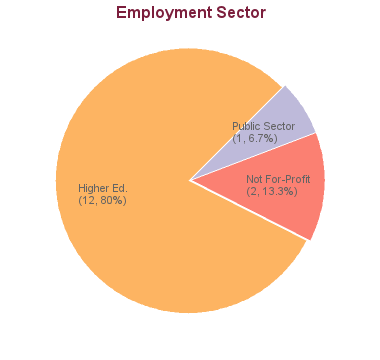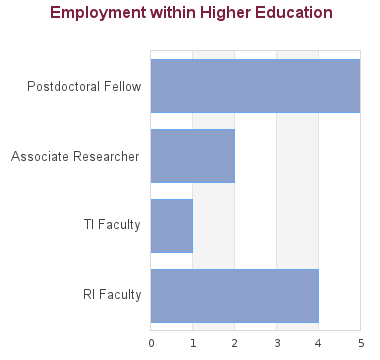Becca Beutel
Doctor of Philosophy in Oceanography (PhD)
Water mass variability on the northeast Pacific shelf and what this means for biogeochemical conditions under a changing climate

Review details about the recently announced changes to study and work permits that apply to master’s and doctoral degree students. Read more
Oceanographers investigate both fundamental and applied problems relating to the physics, mathematics, biology, chemistry, and geology of the sea, often working across traditional academic disciplines. Research carried out both independently and in collaboration with federal government laboratories occurs in many different oceanographic regimes, including coastal BC fjords, the inland sea of the Strait of Georgia, open ocean regions of the Subarctic Pacific, and many other locations, including the Arctic and Antarctic Oceans. The types of problems that can be studied include fundamental questions about the flow of stratified fluids at scales ranging from tens of meters to thousands of kilometers, applied research in estuaries, coastal, and deep-ocean processes, general ocean circulation and climate change issues, marine chemistry, geochemistry, and biogeochemistry, natural product chemistry, marine viruses, fisheries oceanography, plankton ecology and physiology, and primary production of the sea. The Department is well equipped to carry out research in the field (using either its own boat or larger vessels in the oceanographic fleet), at the laboratory bench, and in the numerical heart of a computer. Most problems involve aspects of all three.
Students in Oceanography may select courses, depending on their interest, from the following areas of specialization:
-biological oceanography
-marine chemistry and geochemistry
-physical oceanography and atmospheric sciences
Students are encouraged to broaden their knowledge by taking courses outside their area of specialization. Courses related to Oceanography are also offered in the Departments of Botany, Chemistry, Civil Engineering, Geography, Physics and Astronomy, and Zoology.
The Program builds on a proven record of accomplishments of the core faculty of the Earth, Ocean and Atmospheric Sciences Department that supervised several hundred graduate students. The program brings together 12 full-time faculty allowing students to choose from wide range of concentrations such as biological oceanography, chemical oceanography, and physical oceanography.
The Faculty of Graduate and Postdoctoral Studies establishes the minimum admission requirements common to all applicants, usually a minimum overall average in the B+ range (76% at UBC). The graduate program that you are applying to may have additional requirements. Please review the specific requirements for applicants with credentials from institutions in:
Each program may set higher academic minimum requirements. Please review the program website carefully to understand the program requirements. Meeting the minimum requirements does not guarantee admission as it is a competitive process.
Applicants from a university outside Canada in which English is not the primary language of instruction must provide results of an English language proficiency examination as part of their application. Tests must have been taken within the last 24 months at the time of submission of your application.
Minimum requirements for the two most common English language proficiency tests to apply to this program are listed below:
Overall score requirement: 100
Reading
22
Writing
22
Speaking
23
Listening
22
Overall score requirement: 7.0
Reading
6.5
Writing
6.5
Speaking
7.0
Listening
6.5
Some programs require additional test scores such as the Graduate Record Examination (GRE) or the Graduate Management Test (GMAT). The requirements for this program are:
The GRE is not required.
All applicants have to submit transcripts from all past post-secondary study. Document submission requirements depend on whether your institution of study is within Canada or outside of Canada.
A minimum of two references are required for application to graduate programs at UBC. Each graduate program determines the type of reference (e.g. academic, professional) and number of references they require which can range from 2 to 4. References should be requested from individuals who are prepared to provide a report on your qualifications for the program.
Many programs require a statement of interest, sometimes called a "statement of intent", "description of research interests" or something similar.
Students in research-based programs usually require a faculty member to function as their thesis supervisor. Please follow the instructions provided by each program whether applicants should contact faculty members.
Permanent Residents of Canada must provide a clear photocopy of both sides of the Permanent Resident card.
All applicants must complete an online application form and pay the application fee to be considered for admission to UBC.
In 2012 the new Earth Sciences Building was completed. The $75 million facility was designed to inspire collaboration and creativity across disciplines.
| Fees | Canadian Citizen / Permanent Resident / Refugee / Diplomat | International |
|---|---|---|
| Application Fee | $116.25 | $168.25 |
| Tuition * | ||
| Installments per year | 3 | 3 |
| Tuition per installment | $1,875.34 | $3,294.66 |
| Tuition per year (plus annual increase, usually 2%-5%) | $5,626.02 | $9,883.98 |
| Int. Tuition Award (ITA) per year (if eligible) | $3,200.00 (-) | |
| Other Fees and Costs | ||
| Student Fees (yearly) | $1,144.10 (approx.) | |
| Costs of living | Estimate your costs of living with our interactive tool in order to start developing a financial plan for your graduate studies. | |
Applicants to UBC have access to a variety of funding options, including merit-based (i.e. based on your academic performance) and need-based (i.e. based on your financial situation) opportunities.
All full-time students who begin a UBC-Vancouver PhD program in September or January will be provided with a funding package of at least $25,500.00 CAD plus tuition fee coverage for each of the first four years of their PhD. The funding package may consist of any combination of internal or external awards, teaching-related work, research assistantships, and graduate academic assistantships. Please note that many graduate programs may provide funding packages that are substantially greater than above amount per year. Please check with your prospective graduate program for specific details of the funding provided to its PhD students.
This results in a net balance (any funding provided to the student minus tuition and fees) mean of $39,911 and median of $38,707.
All applicants are encouraged to review the awards listing to identify potential opportunities to fund their graduate education. The database lists merit-based scholarships and awards and allows for filtering by various criteria, such as domestic vs. international or degree level.
Many professors are able to provide Research Assistantships (GRA) from their research grants to support full-time graduate students studying under their supervision. The duties constitute part of the student's graduate degree requirements. A Graduate Research Assistantship is considered a form of fellowship for a period of graduate study and is therefore not covered by a collective agreement. Stipends vary widely, and are dependent on the field of study and the type of research grant from which the assistantship is being funded.
Graduate programs may have Teaching Assistantships available for registered full-time graduate students. Full teaching assistantships involve 12 hours work per week in preparation, lecturing, or laboratory instruction although many graduate programs offer partial TA appointments at less than 12 hours per week. Teaching assistantship rates are set by collective bargaining between the University and the Teaching Assistants' Union.
Academic Assistantships are employment opportunities to perform work that is relevant to the university or to an individual faculty member, but not to support the student’s graduate research and thesis. Wages are considered regular earnings and when paid monthly, include vacation pay.
Canadian and US applicants may qualify for governmental loans to finance their studies. Please review eligibility and types of loans.
All students may be able to access private sector or bank loans.
Many foreign governments provide support to their citizens in pursuing education abroad. International applicants should check the various governmental resources in their home country, such as the Department of Education, for available scholarships.
The possibility to pursue work to supplement income may depend on the demands the program has on students. It should be carefully weighed if work leads to prolonged program durations or whether work placements can be meaningfully embedded into a program.
International students enrolled as full-time students with a valid study permit can work on campus for unlimited hours and work off-campus for no more than 24 hours a week during academic sessions.
A good starting point to explore student jobs is the UBC Work Learn program or a Co-Op placement.
Students with taxable income in Canada may be able to claim federal or provincial tax credits.
Canadian residents with RRSP accounts may be able to use the Lifelong Learning Plan (LLP) which allows students to withdraw amounts from their registered retirement savings plan (RRSPs) to finance full-time training or education for themselves or their partner.
Please review Filing taxes in Canada on the student services website for more information.
Applicants have access to the cost estimator to develop a financial plan that takes into account various income sources and expenses.
17 students graduated between 2005 and 2013. Of these, career information was obtained for 15 alumni (based on research conducted between Feb-May 2016):


The Program would provide graduates with collaborative research skills to lead marine and freshwater research, to address critical challenges of direct and indirect impacts of anthropogenic and climate change effects on aquatic ecosystems and coastal communities. In addition to academia, program graduates will be well placed for academic and/or government research careers, intergovernmental agencies, industry and positions with environmental consulting firms.
These statistics show data for the Doctor of Philosophy in Oceanography (PhD). Data are separated for each degree program combination. You may view data for other degree options in the respective program profile.
| 2023 | 2022 | 2021 | 2020 | 2019 | |
|---|---|---|---|---|---|
| Applications | 6 | 9 | 12 | 6 | 14 |
| Offers | 2 | 1 | 4 | 1 | 5 |
| New Enrolment | 1 | 1 | 4 | 1 | 4 |
| Total Enrolment | 19 | 18 | 21 | 20 | 22 |
Students in research-based programs usually require a faculty member to function as their thesis supervisor. Please follow the instructions provided by each program whether applicants should contact faculty members.
These videos contain some general advice from faculty across UBC on finding and reaching out to a supervisor. They are not program specific.
This list shows faculty members with full supervisory privileges who are affiliated with this program. It is not a comprehensive list of all potential supervisors as faculty from other programs or faculty members without full supervisory privileges can request approvals to supervise graduate students in this program.
Oceanographers investigate both fundamental and applied problems relating to the physics, mathematics, biology, chemistry, and geology of the sea, often working across traditional academic disciplines. Research carried out both independently and in collaboration with federal government laboratories occurs in many different oceanographic regimes, including coastal BC fjords, the inland sea of the Strait of Georgia, open ocean regions of the Subarctic Pacific, and many other locations, including the Arctic and Antarctic Oceans. The types of problems that can be studied include fundamental questions about the flow of stratified fluids at scales ranging from tens of meters to thousands of kilometers, applied research in estuaries, coastal, and deep-ocean processes, general ocean circulation and climate change issues, marine chemistry, geochemistry, and biogeochemistry, natural product chemistry, marine viruses, fisheries oceanography, plankton ecology and physiology, and primary production of the sea.
Departments/Programs may update graduate degree program details through the Faculty & Staff portal. To update contact details for application inquiries, please use this form.
